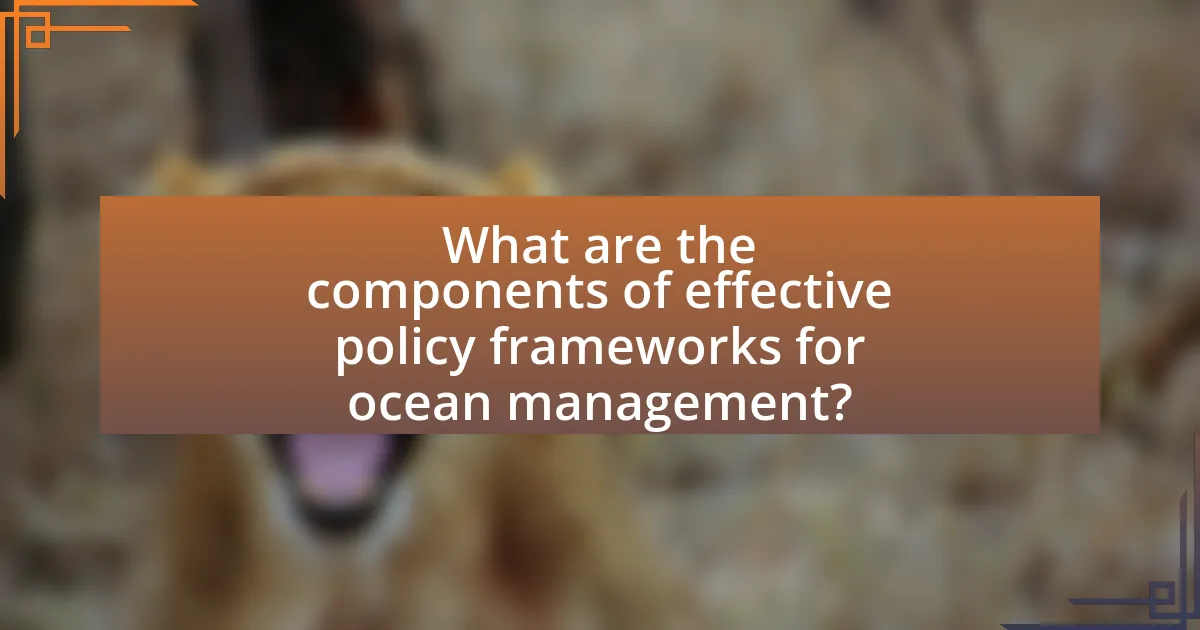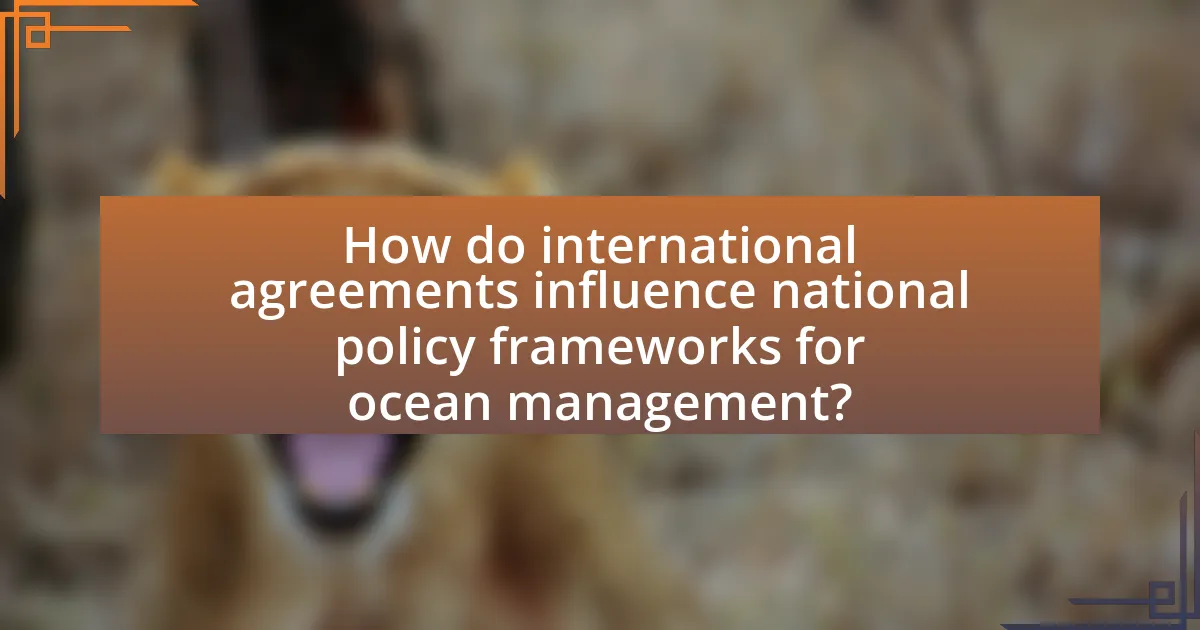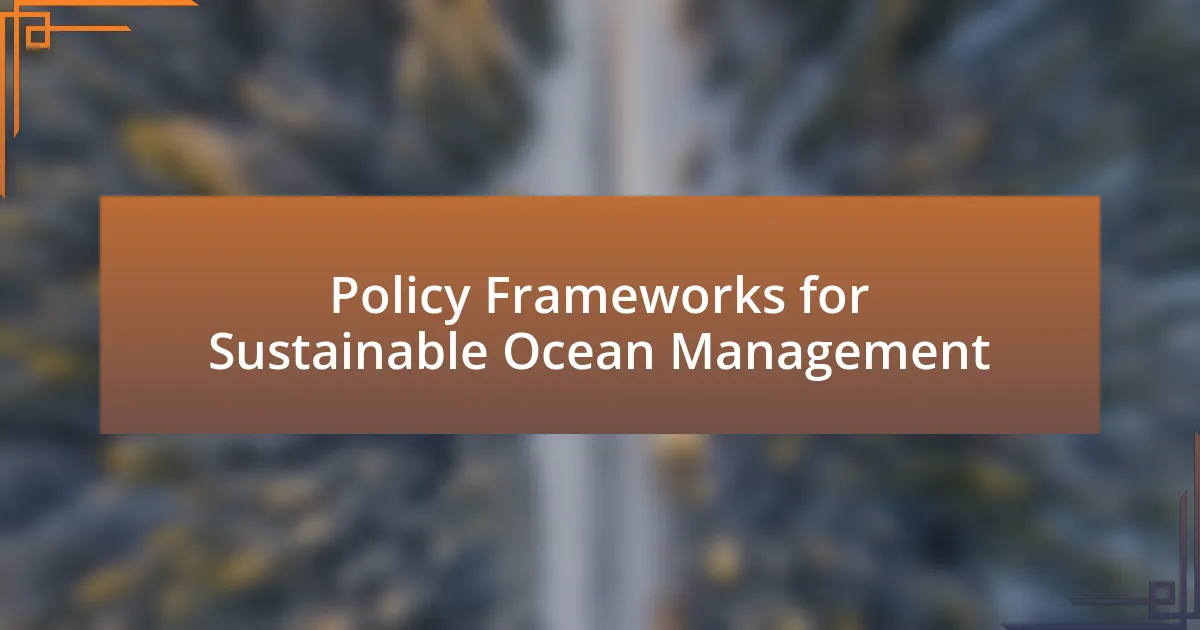Policy frameworks for sustainable ocean management are structured guidelines and regulations aimed at ensuring the responsible use and conservation of ocean resources. These frameworks incorporate principles such as sustainability, stakeholder engagement, and ecosystem-based management to balance economic, social, and environmental objectives. The article discusses the significance of these frameworks in addressing challenges like overfishing, pollution, and climate change, while highlighting key principles that guide policy development, the roles of various stakeholders, and mechanisms for effective implementation. Additionally, it examines the influence of international agreements on national policies and the importance of collaboration among countries for enhanced ocean governance.

What are Policy Frameworks for Sustainable Ocean Management?
Policy frameworks for sustainable ocean management are structured guidelines and regulations designed to ensure the responsible use and conservation of ocean resources. These frameworks typically incorporate principles of sustainability, stakeholder engagement, and ecosystem-based management to balance economic, social, and environmental objectives. For instance, the United Nations Sustainable Development Goal 14 emphasizes the need to conserve and sustainably use the oceans, seas, and marine resources, highlighting the global commitment to effective ocean governance. Additionally, regional agreements, such as the Convention on Biological Diversity, provide specific protocols for protecting marine biodiversity, demonstrating the importance of collaborative international efforts in sustainable ocean management.
How do these frameworks contribute to ocean sustainability?
Policy frameworks for sustainable ocean management contribute to ocean sustainability by establishing guidelines and regulations that promote the responsible use and conservation of marine resources. These frameworks, such as the United Nations Sustainable Development Goal 14, aim to prevent overfishing, protect marine biodiversity, and reduce pollution, thereby ensuring the health of ocean ecosystems. For instance, the implementation of marine protected areas (MPAs) under these frameworks has been shown to enhance fish populations and biodiversity, with studies indicating that MPAs can lead to a 20-50% increase in fish biomass within their boundaries.
What are the key principles underlying these frameworks?
The key principles underlying policy frameworks for sustainable ocean management include ecosystem-based management, stakeholder engagement, adaptive management, and precautionary approaches. Ecosystem-based management emphasizes the interconnectedness of marine ecosystems and aims to maintain their health while considering human activities. Stakeholder engagement involves the inclusion of diverse groups, such as local communities, industries, and governments, to ensure that multiple perspectives are considered in decision-making. Adaptive management allows for flexibility and learning from outcomes, enabling policies to be adjusted based on new information or changing conditions. The precautionary approach advocates for taking preventive action in the face of uncertainty, ensuring that potential harm to marine environments is minimized. These principles are supported by various international agreements, such as the United Nations Convention on the Law of the Sea, which promotes sustainable practices in ocean governance.
How do these principles guide policy development?
Principles guide policy development by establishing foundational values and objectives that shape decision-making processes. In the context of sustainable ocean management, these principles ensure that policies prioritize ecological integrity, social equity, and economic viability. For instance, the precautionary principle encourages policymakers to take preventive action in the face of uncertainty regarding environmental impacts, thereby safeguarding marine ecosystems. Additionally, the principle of stakeholder engagement mandates the inclusion of diverse voices, ensuring that policies reflect the needs and knowledge of local communities. This approach is supported by the United Nations Sustainable Development Goal 14, which emphasizes the importance of sustainable ocean practices and stakeholder involvement in policy formulation.
Why are policy frameworks essential for ocean management?
Policy frameworks are essential for ocean management because they provide structured guidelines that ensure sustainable use and conservation of marine resources. These frameworks facilitate coordinated efforts among stakeholders, including governments, industries, and communities, to address complex ocean challenges such as overfishing, pollution, and habitat degradation. For instance, the United Nations Sustainable Development Goal 14 emphasizes the need for effective ocean governance, highlighting that comprehensive policies can lead to improved marine ecosystem health and resilience.
What challenges do oceans face that necessitate these frameworks?
Oceans face significant challenges such as overfishing, pollution, climate change, and habitat destruction, which necessitate robust policy frameworks for sustainable management. Overfishing depletes fish stocks, with approximately 34% of global fish populations overexploited, according to the Food and Agriculture Organization. Pollution, including plastic waste and chemical runoff, severely impacts marine ecosystems, with an estimated 8 million tons of plastic entering oceans annually. Climate change leads to ocean acidification and rising temperatures, threatening biodiversity and altering marine habitats. Habitat destruction, particularly from coastal development and bottom trawling, further exacerbates these issues, resulting in loss of critical ecosystems like coral reefs and mangroves. These interconnected challenges highlight the urgent need for comprehensive frameworks to ensure the health and sustainability of ocean resources.
How do these frameworks address specific oceanic issues?
Policy frameworks for sustainable ocean management address specific oceanic issues by establishing guidelines and regulations that promote the conservation and sustainable use of marine resources. For instance, the United Nations Convention on the Law of the Sea (UNCLOS) provides a legal framework for the management of ocean resources, addressing issues such as territorial waters, exclusive economic zones, and marine environmental protection. Additionally, frameworks like the Marine Strategy Framework Directive (MSFD) in the European Union set specific targets for achieving good environmental status of marine waters, thereby tackling pollution and biodiversity loss. These frameworks are supported by scientific research and data, which demonstrate their effectiveness in mitigating oceanic challenges such as overfishing, habitat destruction, and climate change impacts.

What are the components of effective policy frameworks for ocean management?
Effective policy frameworks for ocean management consist of integrated governance, stakeholder engagement, scientific research, adaptive management, and regulatory enforcement. Integrated governance ensures collaboration among various levels of government and sectors, facilitating coherent decision-making. Stakeholder engagement involves the participation of local communities, industries, and NGOs, which enhances the legitimacy and effectiveness of policies. Scientific research provides the necessary data and understanding of ocean ecosystems, informing policy decisions. Adaptive management allows for flexibility in policies to respond to new information and changing conditions. Regulatory enforcement ensures compliance with established policies, safeguarding ocean resources. These components collectively contribute to sustainable ocean management, as evidenced by successful case studies in regions like the Great Barrier Reef, where integrated approaches have led to improved ecological outcomes.
What roles do stakeholders play in these frameworks?
Stakeholders play critical roles in policy frameworks for sustainable ocean management by providing diverse perspectives, expertise, and resources essential for effective decision-making. They include government agencies, local communities, non-governmental organizations, and the private sector, each contributing unique insights that shape policies. For instance, local communities offer traditional ecological knowledge, while scientific organizations provide data and research to inform policy. The involvement of stakeholders ensures that policies are inclusive, addressing the needs and concerns of various groups, which enhances the legitimacy and effectiveness of ocean management strategies. Research indicates that stakeholder engagement leads to better compliance and support for policies, as seen in case studies from the United Nations Environment Programme, which highlight successful collaborative governance models in marine conservation.
How can stakeholder engagement enhance policy effectiveness?
Stakeholder engagement enhances policy effectiveness by ensuring that diverse perspectives and expertise are incorporated into the decision-making process. This inclusion leads to more informed policies that address the actual needs and concerns of affected communities, thereby increasing public support and compliance. For instance, research by the World Resources Institute indicates that policies developed with stakeholder input are 30% more likely to be successfully implemented compared to those created without such engagement. By fostering collaboration among stakeholders, policies can be tailored to local contexts, improving their relevance and impact on sustainable ocean management.
What types of stakeholders are typically involved?
The types of stakeholders typically involved in policy frameworks for sustainable ocean management include government agencies, non-governmental organizations (NGOs), local communities, the private sector, and academic institutions. Government agencies are responsible for regulatory oversight and policy implementation, while NGOs advocate for environmental protection and community interests. Local communities provide traditional knowledge and are directly affected by ocean management policies. The private sector, including fisheries and tourism, plays a crucial role in economic activities related to the ocean. Academic institutions contribute research and data to inform policy decisions. Each stakeholder group has distinct interests and responsibilities that influence sustainable ocean management practices.
What are the mechanisms for implementing these frameworks?
The mechanisms for implementing policy frameworks for sustainable ocean management include regulatory measures, stakeholder engagement, and adaptive management practices. Regulatory measures involve the establishment of laws and guidelines that govern ocean use, such as fishing quotas and marine protected areas, which are essential for conserving marine biodiversity. Stakeholder engagement ensures that local communities, industries, and governments collaborate in decision-making processes, fostering shared responsibility and compliance. Adaptive management practices allow for the continuous assessment and adjustment of policies based on scientific research and environmental changes, ensuring that management strategies remain effective over time. These mechanisms collectively support the sustainable use and conservation of ocean resources, as evidenced by successful case studies in various regions that demonstrate improved ecological outcomes and community involvement.
How do regulatory measures support sustainable practices?
Regulatory measures support sustainable practices by establishing legal frameworks that enforce environmental standards and promote resource conservation. These measures, such as emissions regulations and fishing quotas, compel industries to adopt practices that minimize ecological harm. For instance, the implementation of the Marine Stewardship Council’s certification standards has led to a significant increase in sustainable fishing practices, with certified fisheries reporting up to a 50% reduction in overfishing. This demonstrates that regulatory measures not only guide behavior but also yield measurable improvements in sustainability outcomes.
What role does monitoring and evaluation play in implementation?
Monitoring and evaluation are critical components in the implementation of policies for sustainable ocean management. They provide a systematic approach to assess the effectiveness, efficiency, and impact of implemented strategies. By collecting data and analyzing outcomes, monitoring and evaluation help identify areas of success and those needing improvement, ensuring that objectives are met and resources are utilized optimally. For instance, the United Nations’ Sustainable Development Goal 14 emphasizes the importance of monitoring ocean health and the effectiveness of management practices, highlighting that regular evaluation can lead to adaptive management and better decision-making.

How do international agreements influence national policy frameworks for ocean management?
International agreements significantly shape national policy frameworks for ocean management by establishing binding commitments and guidelines that countries must follow. These agreements, such as the United Nations Convention on the Law of the Sea (UNCLOS), provide a legal framework that governs maritime activities, including fishing, shipping, and environmental protection. For instance, UNCLOS outlines the rights and responsibilities of nations regarding ocean resources, which compels countries to align their national laws with international standards to ensure compliance and cooperation. Additionally, agreements like the Paris Agreement influence national policies by promoting sustainable practices and climate resilience in ocean management, thereby encouraging nations to adopt measures that mitigate the impacts of climate change on marine ecosystems.
What are the key international agreements related to ocean management?
The key international agreements related to ocean management include the United Nations Convention on the Law of the Sea (UNCLOS), the Convention on Biological Diversity (CBD), and the Paris Agreement. UNCLOS, adopted in 1982, establishes the legal framework for marine and maritime activities, defining rights and responsibilities of nations regarding ocean use and conservation. The CBD, established in 1992, aims to conserve biological diversity, promote sustainable use of its components, and ensure fair sharing of benefits arising from genetic resources. The Paris Agreement, adopted in 2015, addresses climate change impacts on oceans, emphasizing the need for global cooperation to mitigate these effects. These agreements collectively provide a comprehensive framework for sustainable ocean management, addressing legal, ecological, and climate-related aspects.
How do these agreements shape national policies?
Agreements shape national policies by establishing binding commitments and frameworks that guide countries in their ocean management practices. For instance, international treaties like the United Nations Convention on the Law of the Sea (UNCLOS) set legal standards for maritime boundaries, resource management, and environmental protection, compelling nations to align their domestic laws with these international norms. This alignment often results in the creation of national legislation that addresses sustainable fishing practices, marine biodiversity conservation, and pollution control, thereby directly influencing how countries manage their ocean resources.
What challenges arise from aligning national policies with international standards?
Aligning national policies with international standards presents challenges such as differing regulatory frameworks, resource limitations, and political resistance. National governments often have unique legal and institutional contexts that may conflict with standardized international guidelines, leading to inconsistencies in implementation. For instance, the United Nations Convention on the Law of the Sea (UNCLOS) sets forth international maritime laws, but countries may interpret and apply these laws differently based on their domestic priorities. Additionally, limited financial and technical resources can hinder the ability of nations to comply with international standards, particularly in developing countries where capacity building is essential. Political resistance can also arise from national interests that prioritize local economic activities over international commitments, complicating the alignment process.
How can countries collaborate to enhance ocean management?
Countries can collaborate to enhance ocean management by establishing international agreements that promote sustainable practices and shared governance. For instance, the United Nations Convention on the Law of the Sea (UNCLOS) provides a legal framework for nations to work together on issues like marine biodiversity conservation and pollution control. Collaborative efforts can also include joint research initiatives, data sharing on ocean health, and coordinated responses to environmental challenges such as climate change and overfishing. These collaborative frameworks have been shown to improve resource management and protect marine ecosystems, as evidenced by successful regional fisheries management organizations that have led to the recovery of fish stocks in various areas.
What are the benefits of regional cooperation in ocean governance?
Regional cooperation in ocean governance enhances sustainable management of marine resources, improves environmental protection, and fosters economic development. By collaborating, countries can share best practices, pool resources, and address transboundary issues such as overfishing and pollution more effectively. For instance, the Regional Seas Programme, initiated by the United Nations Environment Programme, has successfully facilitated cooperation among nations to protect marine environments, leading to improved biodiversity and ecosystem health in various regions. Additionally, joint initiatives can lead to more effective enforcement of regulations, as seen in the Caribbean Regional Fisheries Mechanism, which has helped member states combat illegal fishing and promote sustainable practices.
How can shared resources be managed effectively among nations?
Shared resources can be managed effectively among nations through collaborative governance frameworks that promote equitable access and sustainable use. Such frameworks often involve treaties and agreements that establish clear guidelines for resource allocation, conservation measures, and conflict resolution. For example, the United Nations Convention on the Law of the Sea (UNCLOS) provides a legal framework for the management of ocean resources, facilitating cooperation among coastal states and ensuring that shared marine resources are utilized sustainably. Additionally, joint management initiatives, such as regional fisheries management organizations, have been successful in regulating fish stocks and preventing overfishing, demonstrating that collaborative approaches can lead to better resource management outcomes.
What best practices can be adopted for effective ocean management policies?
Effective ocean management policies can be adopted through integrated coastal zone management (ICZM), which promotes collaboration among stakeholders and considers ecological, social, and economic factors. ICZM has been shown to enhance biodiversity conservation and sustainable resource use, as evidenced by the success of programs in countries like Australia and the Netherlands, where stakeholder engagement led to improved coastal resilience and ecosystem health. Additionally, implementing marine spatial planning (MSP) can optimize the use of ocean space, reducing conflicts among users and protecting critical habitats, as demonstrated by MSP initiatives in the United States and Canada that have successfully balanced conservation and economic activities. Lastly, establishing robust monitoring and enforcement mechanisms ensures compliance with regulations, as seen in the European Union’s Common Fisheries Policy, which has improved fish stock recovery through effective management practices.
How can adaptive management improve policy outcomes?
Adaptive management can improve policy outcomes by enabling iterative learning and flexibility in decision-making processes. This approach allows policymakers to adjust strategies based on real-time feedback and changing environmental conditions, which is crucial in dynamic systems like ocean management. For instance, studies have shown that adaptive management practices in fisheries have led to more sustainable stock levels and better economic returns by incorporating scientific data and stakeholder input into ongoing management decisions. This evidence demonstrates that adaptive management not only enhances ecological resilience but also fosters stakeholder engagement, ultimately leading to more effective and sustainable policy outcomes.
What role does public awareness play in supporting sustainable ocean policies?
Public awareness is crucial in supporting sustainable ocean policies as it fosters informed public engagement and advocacy for marine conservation. When individuals understand the importance of ocean health, they are more likely to support policies that protect marine ecosystems. For instance, studies show that communities with higher levels of environmental education are more likely to participate in conservation initiatives and support regulations aimed at reducing pollution and overfishing. Additionally, public awareness campaigns can influence policymakers by demonstrating widespread public support for sustainable practices, leading to stronger legislative action.
